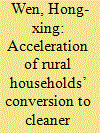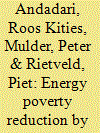|
|
|
Sort Order |
|
|
|
Items / Page
|
|
|
|
|
|
|
| Srl | Item |
| 1 |
ID:
180095


|
|
|
|
|
| Summary/Abstract |
This study investigated the existence of peer effects in the diffusion of clean cooking fuels among rural households in China and identified the mechanisms by which these peer effects were enacted from the perspective of social networks. We observed greater adoption of clean cooking fuels in areas in which adoption was already relatively high, however, this peer spill-over decreased over time and was regulated by the accessibility and strength of social networks. Specifically, if a household's social circle was more extensive or its communication with neighbours, relatives, and friends was closer, its choice of a clean cooking fuel was more likely to be affected by its peer groups. To stimulate stronger peer spill-over, we suggest that interventions such as strengthening social interactions across rural households should be included in the government's strategy to help more households convert to cleaner cooking fuels.
|
|
|
|
|
|
|
|
|
|
|
|
|
|
|
|
| 2 |
ID:
128000


|
|
|
|
|
| Publication |
2014.
|
| Summary/Abstract |
In low- and middle-income countries, Liquefied Petroleum Gas (LPG) can be an attractive alternative to the widespread use of traditional kerosene. Not only is LPG a relatively clean, safe and cost-effective fuel for households, its large-scale adoption also reduces the heavy burden of kerosene consumption subsidies on government budgets. Against this background, we evaluate the impact of a large government program to substitute LPG for kerosene in Indonesia. Using a household survey across urban, suburban and rural regions we find that this program was very effective in causing a large scale shift from kerosene to LPG. This shift was positively influenced by level of education, household size and household income. Contradicting the energy-ladder model, the LPG program, reinforced by an increase in the price of kerosene, led to increased stacking of fuels, including increasing consumption of both electricity and traditional biomass. In addition, our analysis shows that the LPG program failed to substantially reduce the overall number of energy-poor people, but it has been effective in alleviating extreme energy-poverty. Finally, we find that medium and higher income households in suburban areas benefitted most from the LPG program.
|
|
|
|
|
|
|
|
|
|
|
|
|
|
|
|
| 3 |
ID:
110690


|
|
|
|
|
| Publication |
2011.
|
| Summary/Abstract |
A major energy challenge of the 21st century is the health and welfare of 2.7 billion people worldwide, who currently rely on burning biomass in traditional household cooking systems. This Special Issue on Clean Cooking Fuels and Technologies in Developing Economies builds upon an IAEE workshop on this subject, held in Istanbul in 2008 (Foell et al., 2008). It includes several papers from that workshop plus papers commissioned afterwards. The major themes of that workshop and this Special Issue are:
•
Analytical and decision frameworks for analysis and policy development for clean cooking fuels.
•
Making energy provisioning a central component of development strategies.
•
Strategies/business models of suppliers of modern fuels and technologies.
•
Analysis of successes/failures of past policies and programs to improve access to clean cooking.
This introductory paper serves as a preamble to the 11 papers in this Special Issue. It provides a brief background on household cooking fuels and technologies, including: (1) their implications for sustainable development, health and welfare, gender impacts, and environment/climate issues; (2) options and scenarios for improved household cooling systems; and (3) discussions of institutions, programs and markets. It closes with "Research and Action Agendas", initially developed during the 2008 workshop.
|
|
|
|
|
|
|
|
|
|
|
|
|
|
|
|
|
|
|
|
|